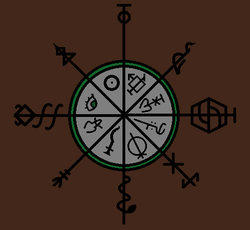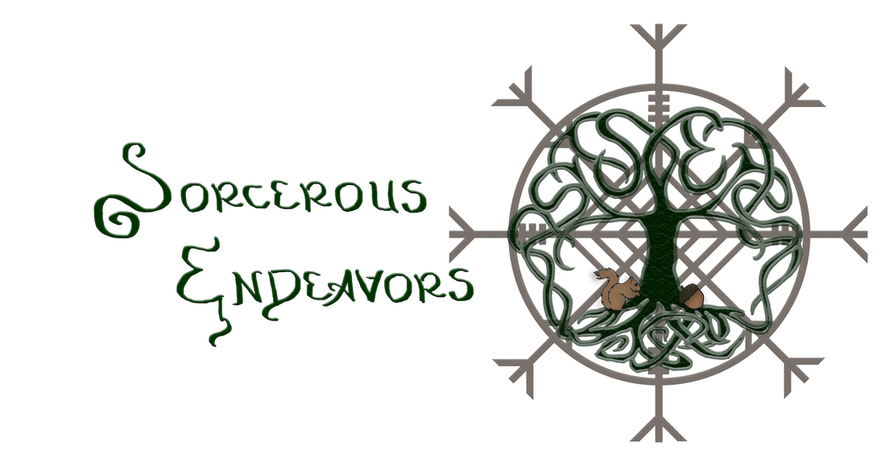
A thread on EvocationMagic got the gears turning in my brain, and I thought that I should write up an article about the importance of perspective. To frame this post, it should be noted that the original topic at hand was necromancy and the associated practices.
Necromancy, for whatever reason, has resurfaced as a topic of intense discussion and debate, as of late. As a result, interested parties have decided that it is a wise idea to seek out someone who speaks openly on the subject and attach themselves firmly to that individual's coattails as if they are the be-all-end-all source of inspiration and worthwhile information. This is dangerous to begin with, but it becomes even more dangerous when one is speaking on the subject of working with the dead, as they are not to be trifled with.
Generally speaking, I am more than a little uncomfortable with discussing the subject publicly. There are a multitude of reasons for this, but one major reason is that I do not wish to offend those who have taken the time to teach me what I know about the subject. There are plenty of aspects thereof that I am, quite literally, bound from speaking of due to oaths I've taken. Having said as much, I will be speaking on it in the abstract for the sake of illustrating my point about the importance of perspective.
Humans are naturally rather biased; we get wrapped up in our preconceived views due to our upbringing and whatnot. As a result, its difficult for us to seek a wider view of the information at hand, despite the fact that it is often incredibly important that we do so. I am a proponent of view that we should seek balance and view each thread of divine inspiration critically and analytically, both without the "cultural bias" inherent to the system as well as with that very bias. In doing so, you view "System X" from both extremes and can then discern where the median between those extremes is.
To explain this using a paradigm most of us are very familiar with, we can look to Christianity. Christianity, regardless of the sect one ascribes to, generally contains two distinct extremes:
- Christ is the one and only son of God. He died for our sins and Satan/Lucifer/The Devil is the "Bad Guy" who wants our souls.
- Christ is a fraud, God's a jerk, and Satan/Lucifer/The Devil is around to enlighten us.
I'm sure my explanation of Christianity as such will draw some flak, but before the Satanists in my audience send me hate mail, you should realize that without Judeo-Christianity there is no Satanism; thereby, Satanism is an extreme view of Christianity.
That said, neither extreme is all that useful at the end of the day, as both of them cause us to put blinders on. The median view between those extremes ends up being something akin to "Christ and Satan both exist, and both are necessary".
If you follow me to that point, consider this, then, on a more global scale and add an element of historical research to the work at hand. Once you've done so, you can then draw similar parallels with certain sects of Buddhism, modern-day Hinduism, Islam, and even some Judaic threads of faith. In doing so, you've encompassed between 6,500 and 7,000 years of human religious history and development. Once you've done that, you can continue the trend and look back further and further until you get to the end of the evidence and the beginning of human development in that arena.
Returning full circle to the topic of necromancy, after you've done the above historical research, you can then look at the evidence of religious practices from however many thousands of years ago. In the case of necromancy, we must look back to the beginning of burial practices. As far as we know, humans first started burying their dead, in one form or another, between 80,000 and 120,000 years ago.
We can assert this because one doesn't bury their dead unless there's an inherent belief in some sort of afterlife, as otherwise the ritual is useless. That being the case, we can assert, through the ritualistic behavior, that some sort of primitive necromantic practice occurred.
Ultimately, this brings me back to the purpose of this post: we don't need to ride the coattails of someone else's work in order to get back to basics and figure out where a lot of this comes from. We have plenty of evidence out there that can be used to enlighten us and shape our views.
Doing our own research doesn't dilute the knowledge transfer quite as much. Sure, it is still going to be diluted, as someone had to interpret the historical data, but that's one less step on the knowledge transfer train. This is important because acknowledging any man or woman as Master, Mistress, Teacher, or any such title means that you are subjecting yourself to their limitations. This goes for all forms of instruction, be it from a human, elemental daemon, deity, or any such thing. That being the case, if you're going to subject yourself to such a thing, realize that this is what you're doing and be willing to look at everything they provide in a critical fashion.
If you're going to be expected to take something on faith, someone should at least have the decency to tell you as much.
I hope this post has been both helpful and enlightening.
Regards,
SE
